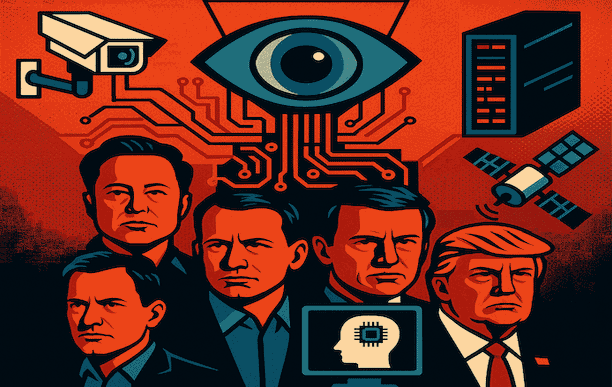Pages: << 1 ... 15 16 17 18 19 20 21 22 23 24 25 ... 1279 >>
The Thought Prison: Predictive Policing, AI Enslavement, and the Rise of America's Invisible Walls
Robert David

I. The New American Panopticon
In 1971, Daniel Ellsberg leaked the Pentagon Papers, exposing the government’s lies about the Vietnam War. Today, a different kind of betrayal unfolds—not through war, but through data, algorithms, and silicon.
The dream of liberty, long the bedrock of American identity, is being replaced by an invisible prison of our own making: a Thought Prison, where predictive policing, mass surveillance, and weaponized AI control not just what we do, but what we are allowed to think.
The builders of this panopticon no longer hide. Donald Trump and J.D. Vance publicly advocate expanding surveillance powers domestically. Meanwhile, corporate oligarchs like Elon Musk and Peter Thiel supply the infrastructure: Palantir’s Gotham, Anduril’s Lattice, Clearview AI’s facial recognition engines. They are not adversaries of the state; they are the state.
Pesticides in Your Peas: The Dirty Secret Behind Aldi and Trader Joe’s ‘Organic’ Labels
Tracy Turner
In recent years, Trader Joe's and Aldi have emerged as successful grocery store chains, with their private-label products that usually bear organic labels. But behind such appealing labels lies a disturbing reality: a significant proportion of these products carry pesticide residues, some even greater than in conventionally produced fruits and vegetables. This article delves into the myths surrounding the "organic" offerings of these chains, the pervasiveness of pesticide contamination, and the pivotal role that consumer consciousness plays in ensuring food safety.
The Organic Label: A Misleading Assurance
The "organic" label is regulated by the United States Department of Agriculture (USDA), which has set standards for organic production practices. These organic standards prohibit the use of synthetic pesticides, herbicides, and genetically modified organisms (GMOs). But the enforcement of such standards is not faultless. A 2024 Consumer Reports analysis revealed that 20% of American fruit and vegetables, including so-called organic ones, had pesticide residues on them. Frightening in its implications was that some of the residues were of pesticides that had been banned over a decade ago, which raises questions about the efficacy of current organic certification mechanisms.
The Precrime Oligarchs: How Silicon Valley and Vance Musk Trump and Thiel Are Engineering Thought Policing
By Chris Spencer
I. The New Alchemists: Turning Paranoia into Profit
In the digital crucible of the 21st century, a strange alchemy has emerged: paranoia transmutes into profit, and the specter of chaos becomes a business model. Surveillance—once the province of intelligence agencies operating in the penumbra of national security—has become a public-private partnership, its tentacles reaching from Langley's corridors to Palo Alto's cafes. The Trump Musk Vance Peter Thiel Mossad Unit 8200 Federal Government is building a Precrime Dragnet and a Precrime Prison Complex in El Salvadore. Precrime is not a distant future but a present reality that demands immediate attention.
This Brave New World isn't science fiction. It's a business plan.
The alchemists of this new age are not wizards but entrepreneurs and operatives: venture capitalists (J.D. Vance, Peter Thiel) who regard democracy as inefficient, engineers who build platforms for predictive policing rather than public discourse, and politicians who launder authoritarian impulses through populist bromides. Together, they form a new alliance—a data-intelligence-industrial complex—whose ideology could be summed up in two chilling words: preemptive governance and mind control. This power dynamic underscores the need for democratic oversight of these technologies.
Vietnam, Truth, and Reconciliation 50 Years Later
By David Swanson, World BEYOND War
Approaching 50 years since the end of the American War, as the Vietnamese call it, and something over 70 years since the start of it, depending when you start the clock, truth and reconciliation remain incomplete. I don’t mean for the people of Vietnam, who seem, from what little I know, in general to have a better grasp of both truth and reconciliation than the U.S. government or corporate media. I also don’t mean truth and reconciliation between governments, which really don’t traffic in either. I mean truth and reconciliation within the United States.
The U.S. government and society have yet to reach any sort of consensus on apologizing to the people of Vietnam, Laos, Cambodia, and the world for the atrocity that was the war on Vietnam. The complex necessity of apologizing to and blaming those who did it — with more apology the lower the rank and more blame the higher — has yet to fully win out over the grotesque absurdity of thanking them and calling the U.S. military’s largest crime in at least these 70 years a “service.” It is of course possible to wish nothing but well for people while also refraining from thanking them for an atrocity.
Politics of Hate Circuses and Balloons: Israel and America Rain Down Death in Payment to Hell
By Mark Aurelius
Has there ever been a word more super-charged, politicized, and over-bloated with frothing and rabid connotation, in our modernity, than terms as hate, hatred, hate speech or acts of hate?
Perhaps there are some, but one’s noggin can be scratched in long, doting befuddlement to come up with much in the way of substantial competition.
How have these supposedly human and prosaic words been bequeathed with such power as to conjure up magic spells of absolutism, infallible judgmentalism, and darkly divine pronouncements of accusation—pointing fingers towards designated hate groups and individuals in the courts of public opinion?
Designing Your Forever Home: Must-Have Features for Aging in Place Comfortably
by Janet Campbell
Choosing a home that accommodates your needs as you age is a significant decision requiring careful thought and planning. It's important to consider features that promote comfort, safety, and long-term accessibility, ensuring the space can adapt to your changing needs over time. Beyond the home itself, the surrounding environment plays a crucial role, offering opportunities for engagement, convenience, and connection. With the right considerations, you can create a living space that supports both your independence and overall well-being for years to come.
A Structural Examination of Gaza's Mortality Crisis: From Counting to Epistemic Breakdown
Robert David
Gaza's Uncounted Dead, a Death-Count of 64,260 Lost Souls Not Counted Due to Rubble-ization, State-Sanctioned Under-Countning and Other Means, Including Israel Hacking Emails and Websites Electronically to Get Their Detractros Websites Linked to Porn, Gambling, Spam-Emails, SpamCop False Positives and "Spam-Vertizing."
At first glance, the figures hit with the weight of a statistical catastrophe—64,260 lives lost due to violent injury in just a few months, a number 40% greater than official counts. But these numbers represent more than just a discrepancy—they highlight the catastrophic failure of a key modern principle: the state's ability to account for those it kills. We're witnessing an epistemic break where the systems that track mortality have been systematically destroyed through three overlapping erasure processes.
Israel's Systematic Killing of Journalists and Western Media Complicity in Portraying Genocide as "Self-Defense"
Fred Gransville
The world has seen an unparalleled slaughter of journalists following Israel's military attack on Gaza in October 2023. At least 103 journalists have been killed during the war within the first 150 days alone. The fatality toll is the highest media practitioner conflict in history. The regime's institutionalized killings of journalists are a reckless disregard for international law, a confirmation of the regime's dedication to muzzling truth. And still, in the presence of irrefutable evidence of targeted killings, Israel has not been held accountable, and Western mainstream media (MSM) continues to frame its actions as acts of "self-defense," essentially obliterating what many legal scholars and human rights organizations have confirmed as genocide.
The DMCA Weaponized: The Dark Face of Web Censorship
The Digital Millennium Copyright Act (DMCA) was signed into law in 1998 and praised as a long-awaited move to help safeguard intellectual property in the new digital age. However, what was meant to protect creators has been increasingly employed as an instrument to stifle opposition, manage information, and enforce conformity, typically in the interest of protecting copyrights. This misuse of the DMCA is a stark injustice that should invoke a sense of indignation in all who value free speech. It also underscores the urgent need for resistance against such misuse, a determination to uphold the principles of free speech.
The Silent War: Mossad’s Global Web of Cyber Espionage Sayanim and the Unseen Battle for Digital Dominance
By Tracy Turner

In the shadowy lanes of global intelligence, wars are no longer fought with bullets and bombs but with backdoors and algorithms. Israel's Mossad, with its unmatched skills, has transformed the battlefield into an invisible war zone where few can see, fewer understand, and even fewer survive.
At its heart is Unit 8200—the cyber warriors who breach systems and create the backdoors that allow them to take over global infrastructure. But they would be useless without a second force, as ghosts and as powerful: the Sayanim (Hebrew for "Helpers"), Mossad's worldwide network of deniable operatives who render covert operations possible with the subtlety of silent whispers.










